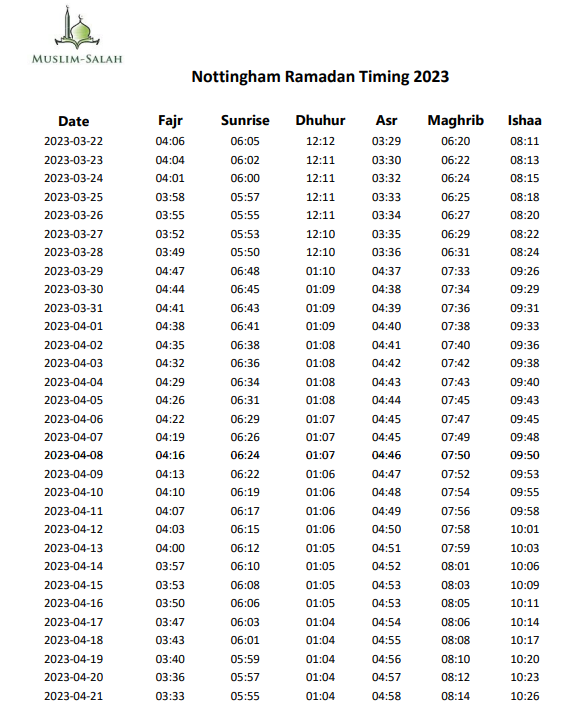Ramadan Timetable Nottingham 2023
Nottingham Ramadan Timetable 2023
Nottingham Ramadan Timetable 2023 provides you the latest information on Nottingham Sahur times and Nottingham iftar times. With the Nottingham Ramadan Timetable 2023 you can find out the prayer times on a daily basis.

Ramadan Timetable 2023 in Nottingham
Alhamdulillah! The blessed month of Ramadan is coming again with all its blessings. Muslim brothers and sisters around the world have been looking forward to this month to worship Almighty Allah and to experience the spirit of the blessed month of Ramadan.
What time is iftar in Nottingham today?
The holy month of Ramadan comes to bless the Islamic world with its spiritual beauties. In this blessed month, believers practice fasting.
„What time is Sahur in Nottingham? Our brothers and sisters who are curious about answers to questions like“ What time is Iftar in Nottingham? „, can download the Ramadan schedule on their computer or phone.
When is Ramadan 2023 in Nottingham?
Ramadan is approaching, the holy month of worship when Muslims gather at iftar tables and homes are filled with peace and prosperity. This year, Ramadan 2023 begins on March 22, 2023 and ends on April 21, 2023
- First Day of Ramadan: Wednesday, March 22
- Last Day of Ramadan: Friday, April 21
- Eid al-Fitr Day 1: Saturday, April 22
- Eid al-Fitr Day 2: Sunday, April 23
- Eid al-Fitr Day 3: Monday, April 24
Fasting takes place in Islam during Ramadan
The five pillars of Islam are the most important commandments for devout Muslims. They include the public profession of faith, daily prayer, social donations, the pilgrimage to Mecca – and fasting during Ramadan. Many non-Muslim people think of the supposedly strict rules: no eating or drinking between sunrise and sunset. But what is actually behind Ramadan, and what rules are there in fact?
Fasting is meant to bring individuals closer to Allah, strengthen the soul, and contribute to greater compassion. For many Muslims, Ramadan is also the time to live charity, to spend beautiful moments with family and friends, and to refocus on the essentials. Therefore Ramadan is more spiritual than it seems.
After sunset, in many families the fast is first broken with a date. Often the whole family with aunts, uncles and grandparents come together to break the fast in the evening or it takes place in the mosque community. Afterwards, it is in principle up to each Muslim what comes on the table. But since it is still Ramadan, one should also restrain oneself when eating in the evening and early morning. Light meals and unsweetened drinks such as water or tea are therefore often preferred. For many, however, it is more about being with the family and the ritual of breaking the fast than about the food itself.
Dua for Breaking Fast
رَبَّنَا وَاجْعَلْنَا مُسْلِمَيْنِ لَكَ وَمِن ذُرِّيَّتِنَا أُمَّةً مُّسْلِمَةً لَّكَ وَأَرِنَا مَنَاسِكَنَا وَتُبْ عَلَيْنَآ إِنَّكَ أَنتَ التَّوَّابُ الرَّحِيمُ
Rabbana wa-j’alna Muslimayni laka wa min Dhurriyatina ‚Ummatan Muslimatan laka wa ‚Arina Manasikana wa tub ‚alayna ‚innaka ‚antat-Tawwabu-Raheem
Our Lord! Make of us Muslims, bowing to Thy (Will), and of our progeny a people Muslim, bowing to Thy (will); and show us our place for the celebration of (due) rites; and turn unto us (in Mercy); for Thou art the Oft-Returning, Most Merciful. (Surah Al-Baqarah – 2,128)
